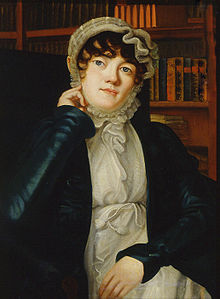Karolina Karlowna Pavlova
Karolina Pavlova ( Russian Каролина Карловна Павлова , born July 10, jul. / 22. July 1807 greg. In Yaroslavl , † December 2 jul. / 14. December 1893 greg. In Dresden Hosterwitz ) was a Russian poet, writer, Translator and painter. She became known, among other things, for her translations of works of Russian literature into German and French, as well as her translations of Western European works into Russian and other languages.
Life
The writer was born as the daughter of the German doctor Karl Jaenisch in Yaroslavl, Russia. In addition to Russian and German, she also spoke French, English and Italian.
As a 19-year-old Karolina Jaenisch met the Polish national poet Adam Mickiewicz in Moscow in 1826 , who was giving young women Polish language lessons at the time, and she fell in love with the poet who was exiled in Russia. Their affection, however, was not returned. We have survived a farewell poem that Mickiewicz dedicated to Karolina Jaenisch in 1829 before he left Russia, as well as a brief exchange of letters. As a painter, Karolina Jaenisch also created two portraits of the Polish prince poet.
When Karolina Jaenisch married the liberal Russian writer Nikolai Pawlow eight years later, she had already acquired a large fortune through an inheritance. After her husband wasted his fortune in the card game, he left her.
Karolina Pavlova devoted herself to writing during her unhappy marriage and also ran a literary salon in Moscow. After the divorce from Nikolai Pavlov, who was punished with a year of exile in Siberia at her father's instigation, she settled first in the Estonian village of Dorpat and later in St. Petersburg .
A trip to Europe took Karolina Pavlova to Constantinople , where Mickiewicz died in 1855. In 1858 she settled in Dresden - the city where Adam Mickiewicz had once promised her a meeting. Here she initially lived in the "Hôtel de la Pologne". Until her death in Dresden in 1893, she is said to have worn a ring that Mickiewicz had given her.
Literary work
Karolina Pavlova is considered to be the most important Russian writer of the 19th century. Her mainly lyrical work includes poems, ballads, elegies and poems. However, she became known through the novel Das Doppelleben , written in prose and verse form , in which she describes the life of a young woman between two worlds - a nightly dreamed-of world that is filled with love and fantasies, and the world of everyday life, which is through one forced marriage of convenience is determined.
She also translated fragments from Mickiewicz ' Konrad Wallenrod as well as a sonnet and a ballad by the poet into German. She also found recognition with her translation of the Maid of Orléans into French (1839) and Heinrich Heines Lorelei into Russian.
The lyrical works of Karolina Pavlova deal primarily with the tragedy of the romantic poet genius, who is becoming more and more lonely due to his artistic vocation - a motif that refers primarily to the romantics Pushkin and Mickiewicz. Equally romantically idealized are a woman's problems in a man-ruled world, while the poems dealing with unrequited love for Mickiewicz are dictated by grief and a futile effort to get over disappointment. Twenty years later the poet remembers the day on which she confessed her love to the young Polish writer. In later works Mickiewicz becomes an apparition, a vision and an idol that she tries in vain to overcome.
Web links
- Literature by and about Karolina Karlowna Pawlowa in the catalog of the German National Library
- Erhard Hexelschneider: Pavlova, Karolina Karlovna . In: Institute for Saxon History and Folklore (Ed.): Saxon Biography .
Individual evidence
- ^ Rolf-Dieter Kluge (ed.): From Poland, poetry and politics. Adam Mickiewicz. Tübingen: Attempto 1999, p. 286. ISBN 3-89308-308-1
- ↑ Kluge (1999), p. 286
| personal data | |
|---|---|
| SURNAME | Pavlova, Karolina Karlowna |
| ALTERNATIVE NAMES | Павлова, Каролина Карловна (Russian) |
| BRIEF DESCRIPTION | Russian writer |
| DATE OF BIRTH | July 22, 1807 |
| PLACE OF BIRTH | Yaroslavl |
| DATE OF DEATH | December 14, 1893 |
| Place of death | Dresden |
